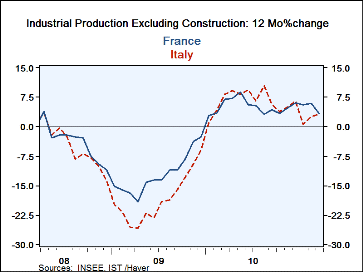 Global| May 10 2011
Global| May 10 2011IP Growth Settles Lower, For Some Faster Than For Others
Summary
Italy and France continue to see their IP trends go more or less the same way as the end game of the economic recovery plays out. Recovery continues but with a differing flavor in the two countries. It is normal for economic recovery, [...]
 Italy and France continue to see their IP trends go more or less the same way as the end game of the economic recovery
plays out. Recovery continues but with a differing flavor in the two countries. It is normal for economic recovery, a
period in which rates of growth exceed long term potential and sustainable rates of growth eventually dissipate into an
period of sustained economic expansion where the growth rates are lower and are sustainable. That process is underway in
the Euro-Area and in Italy and France in particular.
Italy and France continue to see their IP trends go more or less the same way as the end game of the economic recovery
plays out. Recovery continues but with a differing flavor in the two countries. It is normal for economic recovery, a
period in which rates of growth exceed long term potential and sustainable rates of growth eventually dissipate into an
period of sustained economic expansion where the growth rates are lower and are sustainable. That process is underway in
the Euro-Area and in Italy and France in particular.
France like Germany is seeing some improvement in consumption goods output while some weakness creeps into capital goods output. For Italy consumer goods output is still mixed but capital goods output is gaining some pace. Auto output is weakened in March in both countries although not necessarily in the quarter.
For the quarter, taking a broader patch of activity, output is much stronger in France than in Italy with a growth rate at 8.5% compared to 0.6% in Italy. Consumer goods output is falling in Italy in the quarter while in France consumer durables output is up at a 2.8% pace and for nondurables the pace is a strong 11.3%. French capital goods output is stronger on the quarter and is advancing at a pace of 6.8% compared to 2.3% in Italy. Supporting this strength, French intermediate goods output is up at a 16.7% pace in the quarter while Italy’s intermediate goods output is tepid at a pace of 2.6%. Quarterly French output is also stronger with a gain at a pace of 19.2% compared to 4.7% for Italy.
The aggregate pace of IP is more similar for France and Italy than is the pace of the individual components. We are seeing the expansion in Europe mature and as it does the rates of growth for orders and industrial output are descending to a more sustainable profile.
To be sure there are some new risks in the region; the debt problems of Greece and Portugal are most recently in the news. But there is no evidence that any of these concerns are having an impact on the growth in the region at this time.
| French IP Excluding construction | |||||||
|---|---|---|---|---|---|---|---|
| SAAR Except M/M | Mar-11 | Feb-11 | Jan-11 | 3Mo | 6Mo | 12Mo | Q-2-D |
| IP total | -0.9% | 0.5% | 1.0% | 2.2% | 5.5% | 3.3% | 8.5% |
| Consumer Dur | 0.6% | -1.0% | 0.1% | -1.0% | 8.7% | 3.8% | 2.8% |
| Consumer Ndur | 0.1% | 0.0% | 2.6% | 11.2% | 6.5% | 2.0% | 11.3% |
| Capital | -2.6% | 2.9% | -0.3% | -0.4% | 4.7% | 5.8% | 6.8% |
| Intermed | 0.1% | -0.2% | 4.0% | 16.7% | 11.1% | 6.8% | 16.7% |
| Memo | |||||||
| Auto | -5.3% | 1.8% | 0.7% | -11.3% | 25.4% | 2.8% | 19.2% |
| Italy IP Excluding construction | |||||||
| SAAR Except M/M | Mar-11 | Feb-11 | Jan-11 | 3Mo | 6Mo | 12Mo | Q-2-D |
| IP-MFG | 0.6% | 1.4% | -1.5% | 1.8% | 3.4% | 3.8% | 0.6% |
| Consumer | -0.6% | 1.4% | -2.2% | -5.7% | -1.2% | -1.0% | -1.8% |
| Capital | 1.2% | 1.0% | 0.0% | 9.0% | 4.2% | 9.0% | 2.3% |
| Intermed | 0.5% | 0.6% | -0.9% | 1.0% | 5.0% | 4.7% | 2.6% |
| Memo | |||||||
| Transportation | -2.0% | 1.5% | 1.0% | 1.8% | 6.4% | 8.2% | 4.7% |
Robert Brusca
AuthorMore in Author Profile »Robert A. Brusca is Chief Economist of Fact and Opinion Economics, a consulting firm he founded in Manhattan. He has been an economist on Wall Street for over 25 years. He has visited central banking and large institutional clients in over 30 countries in his career as an economist. Mr. Brusca was a Divisional Research Chief at the Federal Reserve Bank of NY (Chief of the International Financial markets Division), a Fed Watcher at Irving Trust and Chief Economist at Nikko Securities International. He is widely quoted and appears in various media. Mr. Brusca holds an MA and Ph.D. in economics from Michigan State University and a BA in Economics from the University of Michigan. His research pursues his strong interests in non aligned policy economics as well as international economics. FAO Economics’ research targets investors to assist them in making better investment decisions in stocks, bonds and in a variety of international assets. The company does not manage money and has no conflicts in giving economic advice.
More Economy in Brief
 Global| Feb 05 2026
Global| Feb 05 2026Charts of the Week: Balanced Policy, Resilient Data and AI Narratives
by:Andrew Cates






